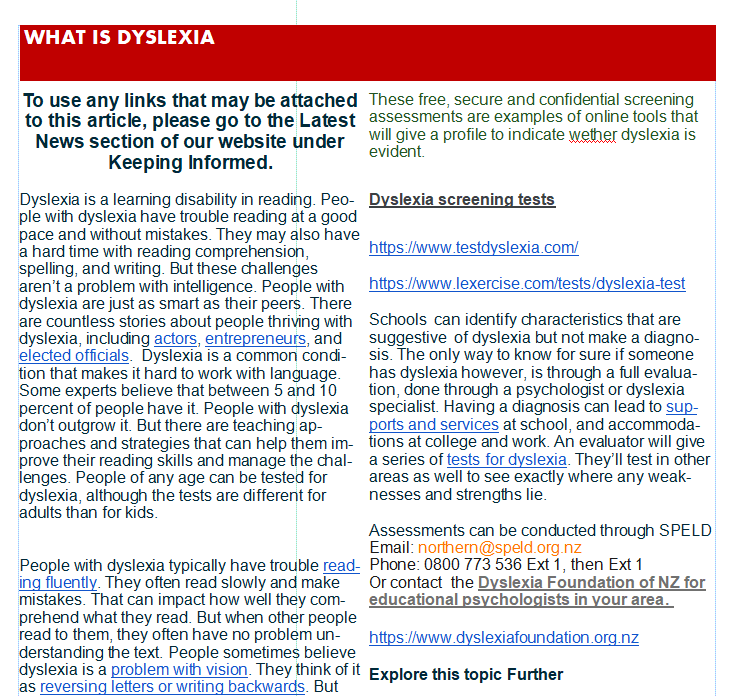Dyslexia is a learning disability in reading. People with dyslexia have trouble reading at a good pace and without mistakes. They may also have a hard time with reading comprehension, spelling, and writing. But these challenges aren’t a problem with intelligence. People with dyslexia are just as smart as their peers. There are countless stories about people thriving with dyslexia, including actors, entrepreneurs, and elected officials. Dyslexia is a common condition that makes it hard to work with language. Some experts believe that between 5 and 10 percent of people have it. People with dyslexia don’t outgrow it. But there are teaching approaches and strategies that can help them improve their reading skills and manage the challenges. People of any age can be tested for dyslexia, although the tests are different for adults than for kids.
People with dyslexia typically have trouble reading fluently. They often read slowly and make mistakes. That can impact how well they comprehend what they read. But when other people read to them, they often have no problem understanding the text. People sometimes believe dyslexia is a problem with vision. They think of it as reversing letters or writing backwards. But dyslexia is an issue with language. A key sign of dyslexia is trouble decoding words. This is the ability to match letters to sounds. Kids can also struggle with a more basic skill called phonemic awareness. This is the ability to recognize the sounds in words. Trouble with phonemic awareness can show up as early as preschool.
Dyslexia can create difficulty with other skills, too. These include:
- Reading comprehension
- Spelling
- Writing
- Math
How dyslexia is diagnosed
These free, secure and confidential screening assessments are examples of online tools that will give a profile to indicate wether dyslexia is evident.
Dyslexia screening tests
https://www.lexercise.com/tests/dyslexia-test
Schools can identify characteristics that are suggestive of dyslexia but not make a diagnosis. The only way to know for sure if someone has dyslexia however, is through a full evaluation, done through a psychologist or dyslexia specialist. Having a diagnosis can lead to supports and services at school, and accommodations at college and work. An evaluator will give a series of tests for dyslexia. They’ll test in other areas as well to see exactly where any weaknesses and strengths lie.
Assessments can be conducted through SPELD
Email: northern@speld.org.nz
Phone: 0800 773 536 Ext 1, then Ext 1
Or contact the Dyslexia Foundation of NZ for educational psychologists in your area.
https://www.dyslexiafoundation.org.nz
Explore this topic Further
- Watch a video to see dyslexia through a child’s eyes.
- Debunk common myths about dyslexia.
- Explore a collection of dyslexia success stories.
- Watch a video about dyslexia and the brain.
- See how reading changes the brain.
- Take a peek inside a day in the life of a teen with dyslexia.
Learn about common classroom accommodations for students with dyslexia
Investigate Resources supporting Dyslexia
The Literacy Clinic
The Literacy Clinic (Katikati, Bay of Plenty, NZ) offers face to face and zoom support for neuro diverse learners with dyslexia, dysgraphia, dyscalculia, dyspraxia, autism, global delay and other differentiated learning challenges. We are dedicated to ‘Building Hope and Growing Futures’ for diverse learners.
Jan Bibby 0273796261 thelitclinic@gmail.com\
Google font for dyslexics
This free chrome extension overrides all fonts on web pages with the OpenDyslexic font and formats pages to be more readable. Letters have heavy weighted bottoms to add a kind of “gravity” to each letter. You are able to quickly figure out which part of the letter is down because of this feature. It aids in recognizing the correct letter and sometimes helps to keep your brain from rotating them around. Consistently weighted bottoms can also help reinforce the line of text. The unique shapes of each letter can help prevent confusion by flipping and swapping.
Read and Write for google chrome (chrome extension)
Boost reading and writing confidence across all types of content and devices, in class, at work, and at home!Wonderfully intuitive and easy-to-use, Read&Write for Google Chrome™ provides personalized support to make documents, web pages and common file types in Google Drive (including: Google Docs, PDF & ePub) more accessible. It’s designed to help everyone engage with digital content in a way that suits his/her abilities and learning styles.Read&Write offers a range of powerful support tools to help you gain confidence with reading, writing, studying and research, including
- Text-to-speech to hear words, passages, or whole documents read aloud with easy-to-follow dual color highlighting
- Text and picture dictionaries to see the meaning of words explained
- With speech-to-text, dictate words to assist with writing, proofreading & studying
- Word prediction offers suggestions for the current or next word as you type
- Collect highlights from text in documents or the web for summarizing and research
- Create and listen to voice notes directly inside of Google Docs
- Simplify and summarize text on web pages to remove ads and other copy that can be distracting

